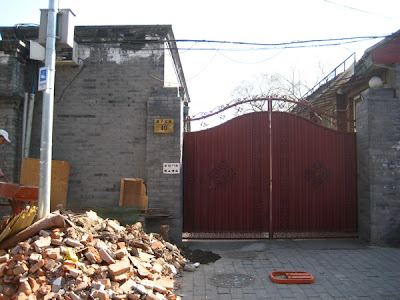Another part of Qing Ming Jie tradition is to give "offerings" to your relatives by burning replicas of things that you think they might need in their respective afterlives. Traditionally, copies of paper money is burnt... I guess so your ancestors can finally get that Snickers Bar they've been eyeing at the Afterlife Concession Stand. But plain ol' cash simply won't do for those who've passed on nowadays, oh no. I learned from my students that paper copies of iPhones, iPads, television sets, cars, even Visas to travel to other countries are available for all your ancestral worship needs.
Locals doing what locals do. These men are playing Chinese chess. To the bottom left corner of this photo, you'll also see a disabled man dragging his torso along the ground, begging for money.
In any case, given that we're sans tomb to sweep, Jason and I decided to take advantage of the beautiful Spring weather that's finally come around to take a walk through old Beijing. Here's a bit of what we saw.
Some hutong doorways.
Locals doing what locals do. These men are playing Chinese chess. To the bottom left corner of this photo, you'll also see a disabled man dragging his torso along the ground, begging for money.
This particular area (Guanzijie) is down the street from the Confucian Temple and Museum, and near Yong He Gong Buddhist Temple, so it's a hot spot for tourists, which means a lot of panhandling. The street is lined with Buddhist fortune tellers, where people can give a sum of money to hear about their futures. While I was taking this picture, I found myself wondering about the future of this beggar. Would anyone in his family ever burn a paper car, television set, or iPhone for him when he's passed, when I'm sure all he wanted during his time on earth was enough to fill his belly and the ability to use his legs.
Of course, it's not a proper day walking around China without your dose of Chingrish signage. For the record, Funny Socks was closed, but from what I could tell about it, it was a real estate office. Yup.
We decided to stop for some lunch. This little Xiao Long Bao (steamed dumplings filled with meat and soup) joint looked pretty good, and the two men working inside urged us to come in. Sure, it wasn't considered what most would call fine dining, but we thought we'd give it a shot.
While the dumplings were tasty and filled us up, they made a rather unwelcome, speedy return visit just one hour later, which necessitated a detour on our subway ride home. I won't go too far into detail, but I'll simply say that given how few tissues I had on me, I was grateful that I'd brought along last month's issue of Time Out Magazine in my backpack. The bright side to all of this is that I found out that subway toilets are a lot cleaner than one would assume!
In the midst of experiencing bits and pieces of "Lao Beijing," we inevitably ran into the cold concrete and soaring immensity of New Beijing, which continues to sprout up and overtake the city without warning. In its own way, New Beijing was also the uninvited guest in many households this Qing Ming Jie, as many Beijing families had to dig up the ashes of their relatives to find a new burial site for them, as they'd been informed by the government that a new building is set to be built on what was the resting place for their parents, grandparents, and ancestors' remains.
Just around the corner from the small hutong where we'd spied on kids playing hide-and-seek by ducking behind wooden wheeled carts, old Beijing seniors chatting with one another, and lap dogs lounging in the sunshine, I saw these three identically giant buildings.
Old Beijing, I hope that by this time next year, we won't be burning paper money in your memory as well. Cheers.












No comments:
Post a Comment